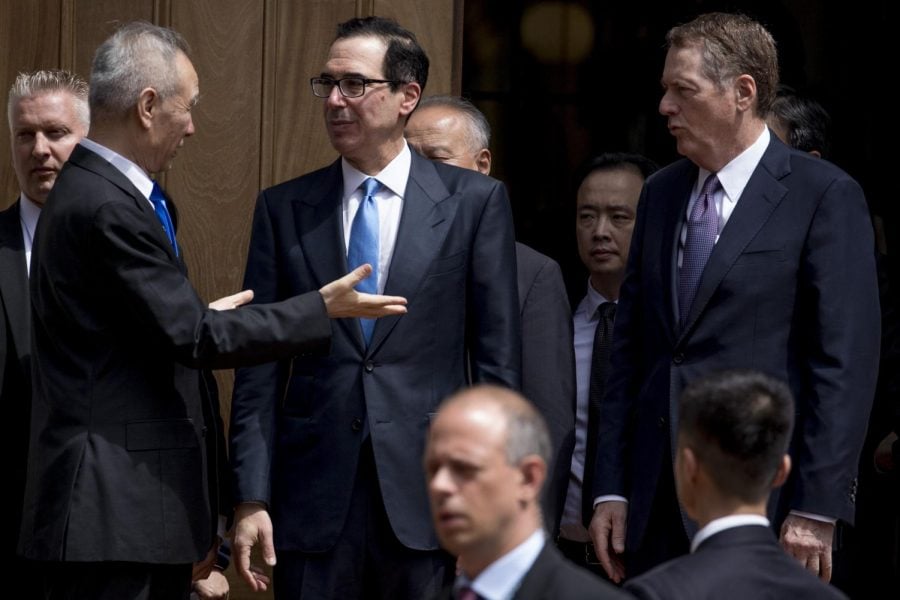White House expects China to retaliate over trade tariffs
AP Photo/Andrew Harnik for The DePaulia
Treasury Secretary Steve Mnuchin, second from left, and United States Trade Representative Robert Lighthizer, right, speak with Chinese Vice Premier Liu He, left, as he departs the Office of the United States Trade Representative in Washington, Friday, May 10, 2019.
WASHINGTON (AP) — The U.S. is awaiting retaliation from China over increased tariffs, after talks in Washington ended without a deal on trade, the president’s chief economic adviser said on Sunday.
“The expected countermeasures have not yet materialized. We may know more today or even this evening or tomorrow,” Larry Kudlow told “Fox News Sunday.” Kudlow also said that President Donald Trump’s plan to raise U.S. tariffs on Chinese goods across the board could take months to take effect.
“Call it a couple of months. Call it three months. I don’t know. That will take some time and then of course the president’s going to have to make the final decision on that,” Kudlow said.
The United States raised tariffs on $200 billion in Chinese imports from 10% to 25% on Friday after American officials accused Beijing of backtracking on commitments made in earlier rounds of negotiations.
Kudlow also acknowledged that China doesn’t pay the tariffs, in contrast to Trump, who has repeatedly tweeted that China pays the tariffs and in doing so transfers wealth to the United States.
“Both sides will pay,” Kudlow said when pressed on the issue. “The Chinese will suffer (economic) losses and so forth with respect to a diminishing export market.”
U.S. importers pay tariff charges, though large retailers might be able to force some Chinese suppliers to cut their prices to offset the duties. But academic studies have found that so far U.S. consumers and businesses are bearing the cost of Trump’s tariff hikes.
Talks in Washington broke off on Friday without a deal, but both sides have indicated that future talks are likely. Kudlow said nothing has been scheduled, but Chinese officials have invited U.S. Trade Representative Robert Lighthizer and Treasury Secretary Steven Mnuchin to visit Beijing.
Kudlow also said that Trump and China’s President, Xi Jingping, may meet in late June at the G20 international conference in Japan.
“I think that China felt they were being beaten so badly in the recent negotiation that they may as well wait around for the next election, 2020, to see if they could get lucky & have a Democrat win,” Trump tweeted Saturday.
Beijing retaliated for previous tariff hikes by raising duties on $110 billion of American imports. And officials have targeted American companies operating in China by slowing customs clearance and stepping up regulatory scrutiny.
Sen. Rand Paul, R-Ky., told ABC’s “This Week” on Sunday that he advised the president to finalize a trade deal with China soon, “because the longer we’re involved in a tariff battle or a trade war, the better chance there is that we could actually enter into a recession because of it.”
The two countries are sparring over U.S. allegations that China steals technology and pressures American companies into handing over trade secrets, part of an aggressive campaign to turn Chinese companies into world leaders in robotics, electric cars and other advanced industries.







